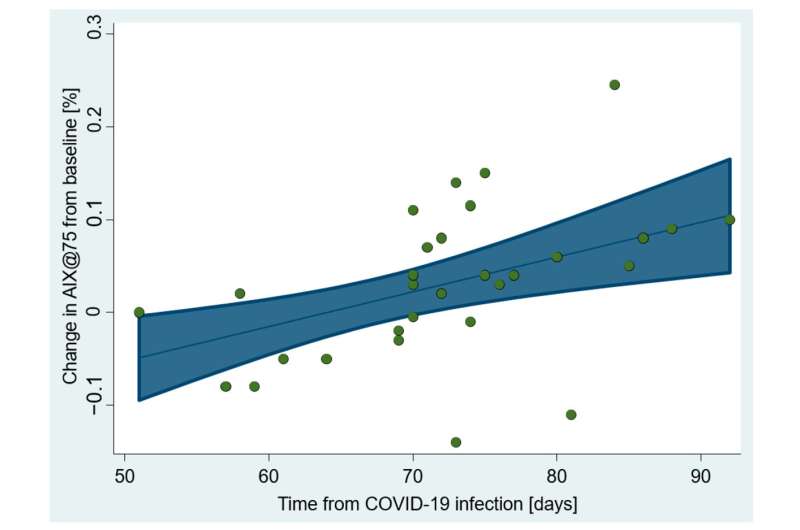This article has been reviewed according to Science X's editorial process and policies. Editors have highlighted the following attributes while ensuring the content's credibility:
fact-checked
trusted source
proofread
Study suggests mild COVID-19 can have harmful effects on cardiovascular health

New research suggests that even mild cases of COVID-19 can have long-term detrimental effects on cardiovascular health.
The study was the first to compare pre and post COVID-infection levels of arterial stiffness; a marker associated with the aging and function of our arteries. The aftermath of the COVID infection, commonly known as long COVID, is associated with increased risk of cardiovascular disease, dementia, and in extreme cases death.
An international team of scientists were able to do this research using baseline measurements from a group of participants involved in a separate study that began pre-pandemic, also investigating arterial stiffness.
In those who had been diagnosed with mild COVID-19, artery and central cardiovascular function were affected by the disease two to three months after infection. Side effects include stiffer and more dysfunctional arteries that could lead to cardiovascular disease development.
The paper, published in the Journal of Clinical Medicine, revealed age and time from COVID infection is associated with increased aging of the arteries.
Co-author, Dr. Maria Perissiou from the University of Portsmouth's School of Sport, Health & Exercise Science, said, "We were surprised to observe such a decline in vascular health, which deteriorated even further with time since COVID-19 infection. Usually, you'd expect inflammation to decrease with time after infection, and for all the physiological functions to go back to normal or a healthy level.
"We can only speculate on what causes this phenomenon without further investigation, but emerging evidence suggests that it stems from COVID-19 triggering the auto-immune process that leads to vasculature deterioration."
While COVID-19 has been associated with a type of acute heart failure and vascular dysfunction, the long-term consequences of the disease on vascular health still need to be explored.
Participants in the study were monitored between October 2019 and April 2022 in the Laboratory for Vascular Aging at the University of Split School of Medicine.
Most were young, less than 40-years-old, and healthy. Only 9% of the group had high blood pressure, and none had high cholesterol. Two were diabetic, and 78% did not smoke. The group was also almost an even split between males (56%) and females (44%).
Professor Ana Jeroncic from the University of Split, who led the study, said, "Given the number of people infected with COVID-19 worldwide, the fact that infection can have harmful effects on cardiovascular health in young people who had a mild form of the disease warrants close monitoring.
"The question remains as to whether this harmful effect is irreversible or permanent, and if not, for how long it lasts."
Dr. Perissiou added, "This study, while small, does support the prediction amongst vascular physiologists that we'll have an increase in cardiovascular disease in the future as a result of COVID-19 infections. But we have to consider what other variables would have contributed to this increase."
The paper concludes the results have important implications for understanding the long-term cardiovascular consequences of COVID-19 infection and may guide prevention and management strategies for associated vascular disease.
However, it recommends further research is needed to strengthen our understanding of causes and contributing factors.
More information: Mario Podrug et al, Long-Term Adverse Effects of Mild COVID-19 Disease on Arterial Stiffness, and Systemic and Central Hemodynamics: A Pre-Post Study, Journal of Clinical Medicine (2023). DOI: 10.3390/jcm12062123




















